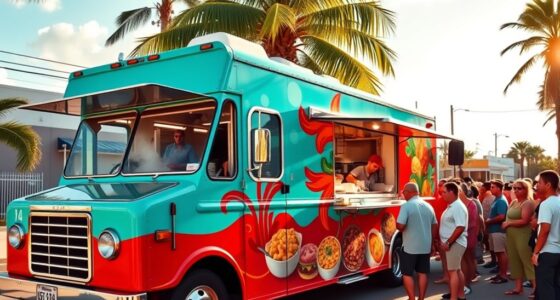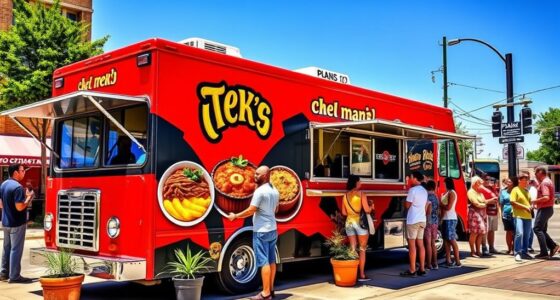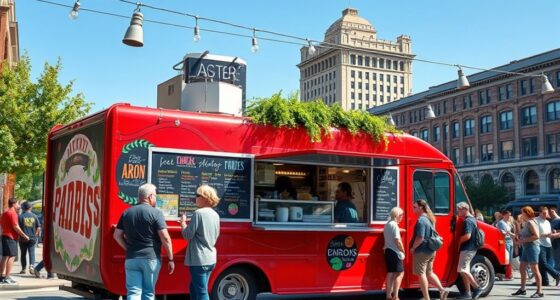Starting a food truck in Madison, WI, means steering through local regulations, securing permits through Madison’s online system, and choosing compliant spots in designated zones. Focus on appealing, farm-to-table menu options that align with community tastes, and develop a strong brand with eye-catching signage and active social media. Budget wisely for equipment and marketing, explore local grants, and plan your launch carefully. If you keep exploring, you’ll find all the tips you need to build a successful food truck business in Madison.
Key Takeaways
- Research Madison’s local food truck laws, zoning, and designated zones to ensure legal operation and parking compliance.
- Complete Madison’s online permit application, submit sanitation documentation, and track approval through the digital permit system.
- Develop a menu featuring local, sustainable ingredients aligned with Madison’s farm-to-table trends and community preferences.
- Choose between shared kitchen licensing or investing in custom equipment, and plan initial startup costs and branding.
- Promote your food truck through social media, local events, and collaborations to build visibility and attract loyal customers.
Navigating Madison’s Food Scene

Madison’s vibrant food scene offers plenty of opportunities for a new food truck, but understanding its local flavors and preferences is essential. To succeed, you should focus on building farm to table partnerships, which resonate with Madison’s emphasis on fresh, locally sourced ingredients. Keeping up with culinary trend analysis helps you stay ahead of evolving tastes, like the growing interest in sustainable and organic options. By aligning your menu with these local preferences, you can attract loyal customers who value quality and community involvement. Attend local food events, engage with farmers, and stay informed about regional food movements. Incorporating advanced market research into your planning can help identify emerging consumer preferences and give you a competitive edge. This approach ensures your food truck becomes a welcomed addition to Madison’s dynamic culinary landscape, increasing your chances of success in this competitive market.
Understanding Local Requirements

To get started, you’ll need to complete the online permit application for your food truck and gather all required sanitation documentation. It’s also important to familiarize yourself with Madison’s designated food truck zones to make certain you park legally. Understanding these local requirements helps you avoid delays and stay compliant as you launch your business. Additionally, exploring vetted options for mobile food setups can provide insight into effective and compliant equipment choices.
Online Permit Application Process
Are you aware of how to navigate Madison’s online permit application system for starting a food truck? The city offers a streamlined digital licensing process, making it easier for you to secure the necessary permits. You’ll need to access the online permit portal, where you can submit all required documentation electronically. First, create an account and fill out the application form, guaranteeing you provide accurate details about your food truck’s operations. Upload relevant supporting documents, such as proof of ownership and compliance with local regulations. Once submitted, you can track your application status through the portal. Madison’s digital licensing system simplifies the process, saving you time and reducing paperwork. Being familiar with this system helps ensure you meet all local requirements efficiently.
Sanitation Procedures and Documentation
After completing your online permit application, it’s important to understand Madison’s specific sanitation requirements to keep your food truck compliant. Proper food safety depends on strict cleaning protocols and accurate documentation. To ensure you meet these standards, focus on:
- Maintaining detailed records of daily cleaning schedules and procedures.
- Regularly sanitizing food contact surfaces according to local guidelines.
- Keeping logs of employee training on sanitation and food safety practices.
Adhering to these steps helps prevent contamination and ensures your truck stays in compliance with health regulations. Madison emphasizes thorough documentation as proof of your commitment to cleanliness. By understanding and implementing these protocols, you protect your customers and your business’s reputation. Stay vigilant and keep detailed records to demonstrate your dedication to food safety.
Designated Food Truck Zones
Understanding Madison’s designated food truck zones is essential for operating legally and efficiently. You’ll need to research approved locations where food trucks can set up, as these zones are regulated to ensure safety and fairness. Choosing the right zone can also help you build strong food truck branding, making your truck more recognizable and attracting repeat customers. When you stick to designated zones, you avoid fines or shutdowns, helping maintain your reputation and foster customer loyalty. Keep in mind that some zones may have specific hours or restrictions, so plan your schedule accordingly. Knowing where you can park and serve not only keeps you compliant but also positions your truck for maximum visibility and success in Madison’s competitive food scene.
Setting Up Your Base of Operations

Choosing the right kitchen setup is vital for your food truck’s success. You can explore shared kitchen licensing options or invest in custom kitchen equipment tailored to your menu. This decision impacts your operations, so consider what best fits your needs and budget. Incorporating detoxifying juices into your menu can also attract health-conscious customers and set your food truck apart.
Shared Kitchen Licensing Options
Setting up your food truck’s base of operations often involves selecting a shared kitchen, which can be a cost-effective and flexible licensing option. Shared kitchen licensing, also known as co-op kitchen permits, allows you to operate in a communal space without the expense of a private facility. When considering shared kitchens, keep in mind these key benefits:
- Lower costs – shared spaces reduce overhead and permit fees.
- Regulatory ease – co-op kitchen permits streamline compliance with local health regulations.
- Networking opportunities – collaborating with other vendors can lead to new business ideas and partnerships.
Choosing a shared kitchen helps you start quickly and stay flexible as your food truck business grows. It’s an efficient way to meet licensing requirements while minimizing upfront investment.
Custom Kitchen Equipment Selection
After securing a shared kitchen space, selecting the right custom kitchen equipment becomes a pivotal step in establishing your food truck’s operations. Your equipment selection should focus on efficiency, durability, and meeting health code standards. Think about which appliances are essential for your menu, like ovens, grills, fryers, and refrigerators. Prioritize high-quality, space-saving options to maximize limited truck space. Consider custom kitchen equipment tailored to your specific needs, ensuring smooth workflow and safety. Research different manufacturers and compare warranties and maintenance support. Proper equipment choice not only boosts your productivity but also minimizes downtime and repairs. Take your time to plan and select equipment that balances cost and quality, setting a solid foundation for your food truck’s success.
Budgeting and Financing Your Food Truck

Understanding your budget is essential when starting a food truck, so you’ll want to review your initial investment breakdown carefully. Look into local small business grants that can help offset costs, and make sure you’re aware of liability coverage requirements to protect your operation. With these financial considerations in mind, you’ll be better prepared to launch your Madison food truck successfully. Considering financial planning tools can also assist in managing ongoing expenses and ensuring sustainability.
Initial Investment Breakdown
Starting a food truck in Madison, WI requires careful budgeting to cover initial costs and secure financing. Your investment breakdown should include essential areas such as:
- Equipment costs – purchasing or leasing the truck, kitchen appliances, and cooking tools.
- Branding expenses – creating a memorable food truck branding that attracts customers and enhances your social media marketing efforts.
- Permits and licenses – securing necessary health permits, business licenses, and insurance.
Focusing on these areas helps you allocate funds wisely. Investing in strong branding and a strategic social media presence boosts visibility and draws in customers. Remember, a well-planned initial investment ensures your food truck starts strong and stays financially healthy from the beginning.
Local Small Business Grants
Securing local small business grants can provide a valuable source of funding for your food truck in Madison, WI, often reducing the amount of personal investment needed. These grants are often awarded through community partnerships and local government programs aimed at supporting small businesses. To increase your chances, leverage social media outreach to connect with local organizations and showcase your business plan. Building relationships with community partners can also lead to valuable referrals or collaborations, boosting your visibility and credibility. Keep an eye on Madison-specific grant opportunities, and be sure to prepare a clear, compelling application that highlights your community impact. Securing these grants can ease your budgeting process, giving you more flexibility to focus on launching and growing your food truck.
Liability Coverage Requirements
Liability coverage is a crucial aspect of budgeting and financing your food truck, as it helps protect your business from potential legal claims and financial setbacks. To make certain you’re adequately covered, consider these key points:
- Choose the right insurance policies that meet local regulations and cover your specific needs.
- Set liability limits high enough to protect against possible damages or injuries caused during operations.
- Regularly review and update your coverage to keep pace with your business growth and changing risks.
Designing Your Menu and Pricing Strategy

When designing your menu, consider incorporating locally sourced ingredients to appeal to Madison’s community and support local farmers. To keep your prices competitive, use ingredient cost control techniques that maximize quality without overspending. Balancing these strategies helps you create a menu that’s both attractive to customers and financially sustainable.
Locally Sourced Ingredient Integration
Integrating locally sourced ingredients into your menu can set your food truck apart and appeal to customers who value freshness and community support. Building strong sourcing partnerships guarantees ingredient freshness and consistent quality. To do this effectively, consider these steps:
- Establish relationships with local farmers and vendors to secure reliable supply chains.
- Highlight the origin of your ingredients on your menu to attract eco-conscious customers.
- Adapt your menu seasonally, using available local produce to keep offerings fresh and exciting.
Focusing on sourcing partnerships not only enhances flavor but also reinforces your commitment to the community. This approach helps you develop a unique brand identity and builds customer loyalty through transparency and quality.
Ingredient Cost Control Techniques
Designing your menu and setting prices thoughtfully can considerably control ingredient costs while maintaining quality. Focus on strategic ingredient sourcing to find affordable, high-quality supplies that suit your menu. By selecting versatile ingredients, you can reduce waste and streamline inventory, leading to significant cost reduction. Consider creating dishes that use overlapping ingredients to maximize efficiency. Price your menu items carefully to ensure you cover costs without overcharging, which could deter customers. Use portion control to prevent excess waste and keep ingredient expenses manageable. Regularly analyze sales data to identify popular dishes and adjust your menu accordingly. This approach helps you optimize ingredient sourcing, cut costs, and maintain quality, ensuring your food truck remains profitable and competitive in Madison’s vibrant market.
Technology and Operations

Implementing contactless payment options makes transactions faster and safer for both you and your customers. Using real-time stock tracking software helps you stay on top of inventory and avoid shortages. These technologies streamline your operations and keep your food truck running smoothly. Incorporating skin hydration benefits into your routine can also help maintain your energy and appearance during busy days.
Contactless Payment Options Available
Have you considered how contactless payment options can streamline your food truck’s operations in Madison? Implementing digital transactions with contactless payment methods can make transactions faster and more secure. This not only enhances customer experience but also reduces cash handling, minimizing errors. Here are three benefits to consider:
- Speed: Customers can pay quickly using cards or smartphones, reducing wait times.
- Security: Digital transactions decrease the risk of theft or fraud associated with cash.
- Convenience: Accepting contactless payments appeals to tech-savvy customers and increases sales.
Real-Time Stock Tracking Software
To keep your Madison food truck running smoothly, real-time stock tracking software is essential. It helps you manage inventory efficiently and strengthens supplier relationships. With this software, you can monitor stock levels instantly, avoid shortages, and reduce waste. It also streamlines reordering processes, ensuring you never run out of key ingredients. Plus, it provides valuable data to optimize your menu based on what’s in stock. Use the following table to see how inventory management improves with real-time tracking:
| Benefit | Impact |
|---|---|
| Accurate inventory data | Minimizes overstock and shortages |
| Faster reordering | Keeps ingredients fresh and available |
| Supplier relationships | Builds trust through timely orders |
| Cost control | Reduces waste and increases profits |
Marketing and Growing Your Presence

To grow your food truck’s presence, leverage popular event scheduling apps to reach local crowds and plan your appearances. Share eye-catching food photos on Instagram to attract new customers and build excitement. Combining these strategies helps you boost visibility and drive more business in Madison.
Popular Event Scheduling Apps
Using the right event scheduling apps can substantially boost your food truck’s visibility and help you connect with your audience effectively. These apps streamline your planning, ensuring your location and hours are easily shared, strengthening your food truck branding. They also enhance your social media marketing efforts by automatically posting updates about upcoming events. To maximize impact, consider these key features:
- Real-time updates — keep your followers informed instantly.
- Calendar integrations — coordinate with other local events for maximum exposure.
- Audience analytics — understand where your best customers are coming from.
Engaging Instagram Food Photos
Capturing eye-catching Instagram food photos is essential for attracting new customers and building your food truck’s brand. Great food photography highlights your dishes’ appeal and makes followers stop scrolling. Use natural lighting and vibrant angles to showcase your menu items at their best. Focus on details that make your food unique and appealing, from toppings to textures. When posting, craft engaging captions and use popular hashtags to boost Instagram engagement. Consistency matters—regularly share fresh photos to stay top of mind. Interact with your followers by replying to comments and encouraging user-generated content. The more appealing your food photos, the more shares and likes you’ll get, expanding your reach. Strong visual content turns casual viewers into loyal customers, fueling your food truck’s growth.
Master Local Food Regulations

Understanding Madison’s local food regulations is essential before launching your food truck. You must navigate permits and health codes that directly impact your food truck branding and menu innovation. To stay compliant:
- Obtain necessary health department permits to serve food legally.
- Follow zoning laws that dictate where your truck can operate.
- Adhere to safety standards for equipment and food handling.
Frequently Asked Questions
What Permits Are Necessary for Outdoor Food Service in Madison?
You need to obtain food truck permits and outdoor food service permits from Madison’s city health department. These permits guarantee your truck complies with health and safety standards. You’ll also need to pass a food safety inspection and secure a business license. Check with the Madison city government for specific requirements and application procedures. Getting these permits is essential to legally operate your outdoor food service in Madison.
How Do I Find Reliable Food Truck Suppliers in Madison?
To find reliable food truck suppliers in Madison, WI, start by researching local supplier reviews online and asking fellow vendors for recommendations. Focus on suppliers known for quality food truck maintenance parts and equipment. Contact multiple vendors to compare prices and services, ensuring they meet your needs. Building strong relationships with trusted suppliers will help keep your food truck running smoothly and avoid costly surprises down the line.
What Are the Best Locations for Food Trucks in Madison?
You hit the nail on the head by focusing on popular food zones like State Street, the Capitol Square, and the UW campus area, which are bustling with potential customers. For food truck parking, look for spots with high foot traffic, nearby events, or markets. These locations attract hungry crowds and give your truck the best shot at success. Keep an eye out for permits and local regulations to stay on the right side of the law.
How Can I Partner With Local Events or Festivals?
You can partner with local events or festivals by offering event sponsorship and building festival partnerships. Reach out to organizers early, propose your food truck as a vendor, and highlight what makes your offerings unique. Attend community events to network and demonstrate your commitment to Madison. These relationships boost your visibility, attract new customers, and help you establish a strong presence in the local food scene.
Are There Any Specific Health Certifications Required in Madison?
Picture yourself in a 1950s diner—clean, organized, and ready to serve. In Madison, you’ll need to meet food safety regulations and pass the health inspection process to operate legally. You’re required to obtain a food license and guarantee your truck adheres to local health standards. Regular inspections ensure your truck stays compliant, so stay updated on Madison’s health department guidelines to keep your food truck business thriving.
Conclusion
Starting your food truck in Madison is like planting a seed in rich soil—you’ll need to nurture it with passion, patience, and smart planning. As your truck grows, it’ll attract hungry crowds and vibrant community connections. Stay adaptable, keep your roots grounded in local regulations, and watch your venture blossom. With perseverance, your food truck will become a lively garden of flavors, nourishing both your dreams and Madison’s bustling food scene.









